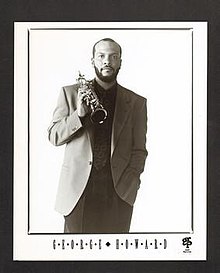George Howard (jazz)
George Howard | |
|---|---|
 George Howard, 1992 | |
| Background information | |
| Born | September 15, 1956 Philadelphia, Pennsylvania |
| Died | March 20, 1998 (aged 41) Atlanta, Georgia |
| Genres | Smooth jazz |
| Occupation | Musician |
| Instrument | Saxophone |
| Years active | 1970s–1998 |
| Labels | Palo Alto, MCA, GRP |
George Howard (September 15, 1956 – March 20, 1998) was an American smooth jazz saxophonist.[1]
Biography
[edit]Early life
[edit]Howard was born in Philadelphia, Pennsylvania, and was only six years old when he began taking music lessons at school on clarinet and bassoon.[2] Influenced by John Coltrane and Wayne Shorter, he later on chose the soprano saxophone, because it resembled the bassoon.[3] By the time he was 15, he began touring the country with notable rhythm-and-blues groups such as Blue Magic, First Choice and Harold Melvin and the Blue Notes.[4] In the late 1970s, he toured with saxophonist Grover Washington, Jr., who was one of his idols.[2]
Music career
[edit]In the early 1980s, Howard started his solo career, and released his first and second studio albums, Asphalt Gardens in 1982, and Steppin' Out in 1984. Both albums were well received and ranked high on the Billboard magazine jazz album charts at No. 25 and 9, respectively. The last track on Steppin' Out is called "Dream Ride", and features Howard playing soprano saxophone.[5] The track was promoted in 1984 in the United Kingdom by DJ Robbie Vincent, and is now a classic among soul and jazz enthusiasts. By 1985, his third album, Dancing in the Sun, had scaled the Billboard Jazz Album chart to No. 1. His next album, Love Will Follow (1986) topped the Billboard Jazz Albums chart. After the release of that album he left Palo Alto to join MCA Records. Only for his subsequent albums A Nice Place to Be (1986), and Reflections (1988), to also top the said chart. Howard's next album, 1990's Personal featured his biggest hit single "Shower You With Love".[6][7]
Later that year, he signed with GRP and in 1991 released Love and Understanding. This album was followed by Do I Ever Cross Your Mind? (1992) and When Summer Comes (1993). He later released A Home Far Away (1994), which features the song "Grover's Groove", a tribute to Washington Jr.,[8] and Attitude Adjustment (1996). His first five years with GRP, plus a selection of his MCA recordings, were summarized on 1997's The Very Best of George Howard and Then Some. During the 1996 Summer Olympics in Atlanta, Georgia, Howard performed at a hospitality house for the continent of Africa, which influenced his music after a visit there.[7] Howard returned to recording with Midnight Mood, which was released in January 1998, and was his final album released under GRP.
Death
[edit]Howard died from colon cancer at Piedmont Hospital in Atlanta on March 20, 1998, at the age of 41.[9][6] His final album, There's a Riot Goin' On was released posthumously under the Blue Note Records label two months after his death. Howard was survived by his daughter, Jade Howard, and two sisters, Mary Howard and Doris Beverly.[9]
Discography
[edit]- 1982: Asphalt Gardens (Palo Alto)
- 1984: Steppin' Out (Palo Alto)
- 1985: Dancing in the Sun (Palo Alto)
- 1986: Love Will Follow (Palo Alto)
- 1986: A Nice Place to Be (MCA)
- 1988: Reflections (MCA)
- 1990: Personal (MCA)
- 1991: Love and Understanding (GRP)
- 1992: Do I Ever Cross Your Mind? (GRP)
- 1993: When Summer Comes (GRP)
- 1994: A Home Far Away (GRP)
- 1996: Attitude Adjustment (GRP)
- 1997: The Very Best of George Howard and Then Some (GRP)
- 1998: Midnight Mood (GRP)
- 1998: There's a Riot Goin' On (Blue Note)
References
[edit]- ^ George Howard at AllMusic
- ^ a b Myers, Patricia (March 1, 1998). "George Howard: Urban Renewal". The Jazz Times. Retrieved March 9, 2022.
- ^ "George Howard; Jazz Saxophonist, Multiple Grammy Nominee". Los Angeles Times. March 28, 1998. Retrieved March 9, 2022.
- ^ Arnold, Thomas K. (May 18, 1988). "Kool and Gang, Jazz Greats on Tap". Los Angeles Times. Retrieved March 10, 2022.
- ^ George Howard - Dream Ride, September 19, 2012, archived from the original on December 13, 2021, retrieved August 8, 2021
- ^ a b "Deaths Elsewhere". The Washington Post. March 27, 1998. Retrieved June 29, 2022.
- ^ a b "Saxophonist George Howard Passes at 41". Fuller Up, The Dead Musicians Directory. March 22, 1998. Retrieved March 16, 2022.
- ^ Joyce, Mike (September 30, 1994). "Howard's Tribute: Just Same Old Song". The Washington Post. Retrieved June 29, 2022.
- ^ a b "George Howard, 41, Jazz Saxophonist". The New York Times. April 20, 1998. Retrieved March 9, 2022.
External links
[edit]- VH1 bio Archived October 15, 2012, at the Wayback Machine
- Fuller Up Dead Musician directory Archived May 17, 2013, at the Wayback Machine
- Soulwalking site bio
- 1956 births
- 1998 deaths
- American jazz soprano saxophonists
- American male saxophonists
- Jazz musicians from Philadelphia
- Smooth jazz saxophonists
- Palo Alto Records artists
- MCA Records artists
- GRP Records artists
- 20th-century American saxophonists
- 20th-century American male musicians
- American male jazz musicians
- Deaths from colorectal cancer in the United States
- Deaths from cancer in Georgia (U.S. state)
